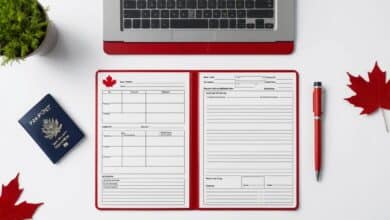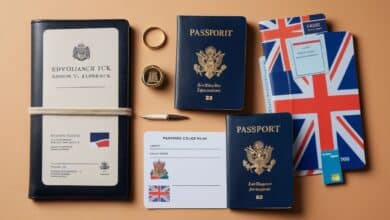Visa Sponsorship in Malta: Gateway to a Marriage Visa for Your Partner
Malta’s sunny Mediterranean charm isn’t its only draw.
As a European Union hub with a thriving tech scene, this island nation attracts professionals worldwide. Its strategic location offers more than picturesque coastlines—it opens doors to streamlined travel across 26 Schengen countries.
For skilled workers relocating here, understanding legal pathways for partners is crucial. Employment-based permits often serve as stepping stones for family reunification. The process balances economic priorities with policies supporting long-term relationships.
This guide breaks down how professionals can navigate Malta’s immigration framework. From work authorization to spousal eligibility criteria, each step requires careful planning. The country’s regulations prioritize both workforce needs and family unity, creating opportunities for couples to build lives together.
With 90-day Schengen travel privileges, Malta positions itself as an ideal base for global citizens. Recent economic growth has sharpened its focus on attracting talent while maintaining clear procedures for family-based applications. Whether through tech roles or other high-demand sectors, the journey begins with proper documentation and local insights.
Understanding Visa Sponsorship and Marriage Visa in Malta
Malta’s immigration framework offers structured solutions for professionals seeking to bring partners. The system combines employment opportunities with family-oriented policies, creating balanced pathways for long-term residency.
Advantages for International Couples
Successful applicants gain more than residency rights. Access to public healthcare and education systems becomes available immediately. One immigration official notes: “We prioritize families contributing to Malta’s economy while maintaining robust verification processes.”
EU citizens enjoy faster processing times—often 30% quicker than non-EU cases. Partners of Maltese workers can apply for work authorization simultaneously, accelerating integration.
Essential Conditions for Approval
Three primary factors determine eligibility:
- Certified marriage or civil union documentation
- Proof of stable income exceeding €20,000 annually
- Registered residential address meeting space requirements
Non-EU nationals must coordinate applications through the Identity Malta agency. Processing typically takes 4-6 months, with biometric appointments scheduled within 14 days of submission.
Navigating the Work Visa Process in Malta
Securing authorization to work in Malta demands precise preparation. Employers and applicants must collaborate closely to meet strict regulatory standards.
Employment Contract and Required Documentation
A valid employment contract forms the backbone of any application. This document must specify:
- Job title and detailed responsibilities
- Salary meeting Maltese minimum wage requirements
- Contract duration aligned with permit validity
Additional documentation includes medical insurance valid in EU countries and bank statements showing three months of financial history. Non-English documents require certified translations.
Application Fees and Processing Times
The standard application fee starts at €300. Hidden costs often emerge for:
- Emergency medical certificates (€80-150)
- Document authentication services (€25/page)
- Priority processing upgrades (€200+)
Most cases resolve within six weeks, though summer applications frequently take eight weeks. Delays occur when employers omit labor market test proofs or fail to submit tax compliance certificates.
Immigration Compliance and Legal Considerations in Malta
Navigating Malta’s immigration laws requires precision to avoid costly errors. Employers face fines up to €50,000 for hiring workers with improper documentation. Workers risk deportation and multi-year entry bans if their status doesn’t match employment activities.
Local Employment Legislation
Maltese labor rules demand strict adherence for foreign hires. Key requirements include:
- Valid work permits matching job descriptions
- Minimum monthly wage of €835 for full-time roles
- Maximum 48-hour workweek including overtime
Companies must file quarterly reports to Identity Malta. Recent audits show 23% of businesses failed to update employee status changes within mandated 15-day windows.
Taxation and Regulatory Obligations
Malta’s tax system offers relief through 70+ double taxation agreements. Foreign nationals pay progressive rates from 0% to 35%, with deductions for:
- Child education expenses
- Private health insurance
- Cross-border pension contributions
“Proper tax planning reduces liabilities by 18-22% for international employees,” notes Valletta Tax Consultancy’s 2024 report.
Sponsors must maintain updated records of housing arrangements and employment contracts. Late renewal filings trigger automatic visa suspension for dependents.
Digital Nomad and Work Permit Options
Malta’s evolving work policies cater to modern professionals seeking flexibility. Remote workers now access streamlined pathways through specialized permits. These options blend mobility with compliance, ideal for those balancing international careers and family life.
Nomad Residence Permit Insights
The nomad residence permit allows remote employment with foreign companies while living in Malta. Applicants must prove monthly income exceeding €2,700 after tax. Required documents include:
- Valid employment contract lasting 6+ months
- Health insurance covering Maltese territory
- Rental agreement for approved accommodation
Processing takes 4-6 weeks. Successful applicants receive one-year permits renewable for two additional years. This differs from traditional work permits by eliminating local employer sponsorship needs.
Schengen Visa Overview for Short Stays
Malta’s Type C visa permits 90-day stays within 180 days across Schengen countries. Key features include:
- Multiple entries during validity period
- Family member inclusion for joint travel
- Borderless movement between 26 European nations
Digital nomads often combine this with residence permits for extended regional access. Travel authorities note that overstaying triggers automatic entry bans. Proper planning ensures seamless transitions between visa types.
These frameworks enable professionals to maintain global careers while establishing roots in Malta. Recent updates prioritize clear income verification and housing standards, reducing application delays by 40% since 2022.
Understanding Different Long-Stay Visa Types
Malta offers multiple pathways for extended stays through its Type D national visa. This authorization permits foreign nationals to reside for up to 365 days, with renewal options based on specific categories. Each category serves distinct purposes while creating opportunities for future residency.
Family, Study, and Investment Visas
Four primary categories dominate Malta’s long-stay options:
- Family visas: Reunite spouses/children with residents. Requires proof of relationship and financial stability
- Study visas: Valid for academic programs. Allows spouses to apply for dependent permits
- Investment visas: Requires €500,000+ in real estate or business ventures. Includes family benefits
Processing times vary between 8-14 weeks. Type D applicants must demonstrate:
- Medical insurance covering €30,000
- Clean criminal record from home country
- Proof of accommodation meeting size standards
Renewals demand updated documentation and compliance checks. Immigration advisors recommend choosing categories aligning with long-term goals, as transitions between visa types require reapplication.
Essential Documents and Procedures for Obtaining Visas
Proper documentation forms the foundation of successful visa applications in Malta. Authorities require precise formatting and authentication to verify identities and relationships. Errors in paperwork often lead to delays or rejections, making attention to detail critical.
Birth and Death Certificates Documentation
Malta’s Public Registry issues standardized certificates with security features. Birth records cost €9.95 online or €10.25 in person. Death certificates follow identical pricing and formats. Key details include:
- A3-sized full certificates or A4 extracts
- Metallic seals and color-coded designs
- Legal validity across EU member states
Applications can be submitted through www.certifikati.gov.mt or at the Onda Building in Marsa. Processing takes 3-5 business days for standard requests. Same-day services cost 50% extra but guarantee immediate issuance.
Foreign documents require apostille stamps (€12 fee) through Malta’s Legalisation of Documents Unit. Certified translations must accompany non-English materials. The Consular Services Office in Valletta handles authentication for international submissions.
Preparation timelines vary significantly. Authentication adds 10-14 days to processing schedules. Applicants should start gathering documents 3 months before planned travel dates. Proper planning prevents last-minute complications with entry requirements or employment start dates.
Role of Employer of Record in International Hiring for Malta
Expanding teams across borders presents unique challenges for companies. Employer of Record solutions bridge this gap through specialized expertise in Maltese labor laws. These services allow businesses to focus on operations while ensuring full regulatory compliance.
Streamlining Work Authorization Processes
An Employer of Record acts as the legal entity for foreign hires. This structure eliminates the need to establish local subsidiaries. Companies bypass lengthy registration processes while maintaining control over daily workflows.
Key benefits include handling payroll taxes, benefits administration, and work permit applications. International hiring becomes faster through pre-established compliance frameworks. EOR providers manage document submissions, reducing approval times by 30-45 days compared to traditional methods.
For South African businesses, this model minimizes financial risks. It ensures adherence to Malta’s employment standards without upfront investments in local infrastructure. Teams gain flexibility to scale operations while meeting cross-border legal requirements seamlessly.
For more information, explore the official visa website mentioned in this article:
You will be redirected to another website
FAQ
What are the eligibility criteria for a marriage visa in Malta?
Applicants must prove a legally recognized marriage or civil union, provide financial stability evidence, and submit valid identity documents. The sponsoring partner must hold Maltese residency or citizenship.
How long does it take to process a Maltese work visa?
Processing typically takes 4–8 weeks, depending on document verification and employer compliance. Delays may occur if additional documentation or background checks are required.
Can a work permit holder in Malta sponsor a spouse’s visa?
Yes, individuals with a valid Maltese work permit and stable income can sponsor their spouse’s residence permit. Proof of accommodation and financial means is mandatory.
What documents are needed for a Nomad Residence Permit?
Applicants must submit proof of remote employment, health insurance, a clean criminal record, and sufficient income (minimum €2,700 monthly). A rental agreement or property ownership proof is also required.
Are Schengen visa holders allowed to work in Malta?
Short-stay Schengen visas do not permit employment. For work authorization, a separate Maltese work permit or long-stay visa must be obtained before starting employment.
What role does an Employer of Record play in visa sponsorship?
An EOR handles payroll, tax compliance, and employment contracts, streamlining visa applications for foreign hires. This reduces administrative burdens for both employers and employees.
Is an employment contract mandatory for a Maltese work visa?
Yes. A signed contract from a Maltese-registered employer outlining job role, salary, and duration is required. The employer must also prove no qualified Maltese/EU candidates are available for the position.
What taxes apply to foreign workers under a Maltese work permit?
Employees pay progressive income tax (0–35%) based on earnings. Employers contribute social security taxes. Non-residents are taxed only on Malta-sourced income.
Can family visas be converted to work permits in Malta?
Family visa holders must apply separately for a work permit. Transition requires an employer’s job offer and approval from Identity Malta’s Employment Licencing Unit.
How does Malta verify birth certificates for visa applications?
Birth certificates must be apostilled or legalized by the issuing country’s authorities. Translations into Maltese or English by certified professionals are required for non-EU documents.
Published on: 26 de June de 2025

Bakari Romano
Bakari Romano is a finance and investment expert with a strong background in administration. As a dedicated professional, Bakari is passionate about sharing his knowledge to empower individuals in managing their finances effectively. Driven by this mission, he founded FinancasPro.com, where he provides insightful and practical advice to help people make informed financial decisions. Through his work on the site, Bakari continues to make finance accessible and understandable, bridging the gap between expert knowledge and everyday financial needs.






